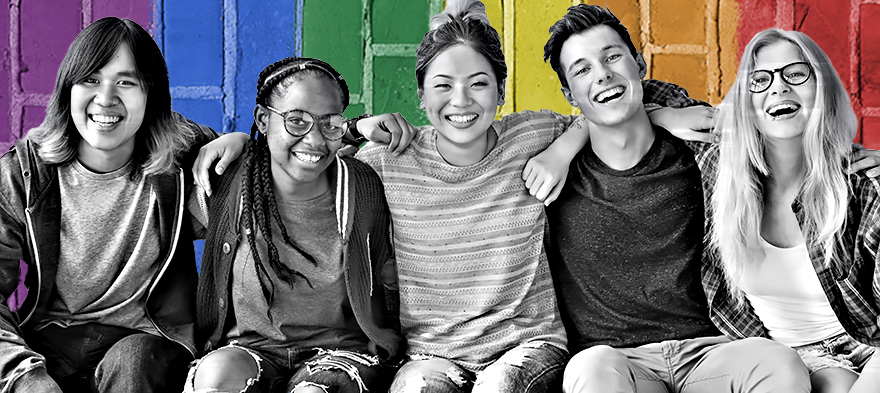
In 2018, GLSEN's national school climate study indicated that 59.5% of LGBTQ students “felt unsafe at school because of their sexual orientation and 44.6% felt unsafe because of their gender expression.”
This means that [pullquote position="right"]we need to be doing more to support our LGBTQ+ students.[/pullquote]
In response to this data, some state policymakers are starting to mandate new changes. “New Jersey lawmakers earlier this year passed a law requiring schools to offer instruction that accurately represents the ‘political, economic, and social contributions of persons with disabilities and lesbian, gay, bisexual, and transgender people.’” California, Colorado, Illinois and Maryland have passed similar legislation, and I hope that more states will follow their lead.
It wasn’t until I taught at an Area Learning Center (i.e., alternative high school) that I realized my curriculum was inadvertently causing educational trauma for some of my students. I was not fully supporting educational equity in all the ways I could have been and some of my students felt left out because they couldn’t see themselves in my curriculum.
As educators, we need to consistently reflect on our practices to ensure that we are supporting students in every way possible and that we are not making choices that would inhibit their success. Inadvertent mistreatment of students can stem from biases (explicit and implicit) and our own unresolved issues and can manifest directly in discriminatory and unsupportive actions toward students.
All students benefit when they can learn from a variety of experiences and perspectives. My experiences have taught me that students who can see themselves in both their schools and in their curriculum will find more success.
Working with student populations who have been historically oppressed and marginalized has also taught me that when students do not see themselves in their curriculum, they can feel invisible and like they don’t matter. And since “Neuroscientists believe that emotions are fundamental to learning,” I believe we can safely conclude that students who do not feel like they matter will most likely have more difficulty connecting to their “learning brains.”
Every student deserves to feel like they matter and it is up to us to improve our practices in order to help them find success. [pullquote]Making sure that students can see themselves in their curriculum is a critical step toward achieving educational equity.[/pullquote] I hope more educators will do this work regardless of whether or not it is mandated by law because our LGBTQ+ students are counting on us.
Sharif El-Mekki is the Founder and CEO of the Center for Black Educator Development. The Center exists to ensure there will be equity in the recruiting, training, hiring, and retention of quality educators that reflect the cultural backgrounds and share common socio-political interests of the students they serve. The Center is developing a nationally relevant model to measurably increase teacher diversity and support Black educators through four pillars: Professional learning, Pipeline, Policies and Pedagogy. So far, the Center has developed ongoing and direct professional learning and coaching opportunities for Black teachers and other educators serving students of color. The Center also carries forth the freedom or liberation school legacy by hosting a Freedom School that incorporates research-based curricula and exposes high school and college students to the teaching profession to help fuel a pipeline of Black educators. Prior to founding the Center, El-Mekki served as a nationally recognized principal and U.S. Department of Education Principal Ambassador Fellow. El-Mekki’s school, Mastery Charter Shoemaker, was recognized by President Obama and Oprah Winfrey, and was awarded the prestigious EPIC award for three consecutive years as being amongst the top three schools in the country for accelerating students’ achievement levels. The Shoemaker Campus was also recognized as one of the top ten middle school and top ten high schools in the state of Pennsylvania for accelerating the achievement levels of African-American students. Over the years, El-Mekki has served as a part of the U.S. delegation to multiple international conferences on education. He is also the founder of the Fellowship: Black Male Educators for Social Justice, an organization dedicated to recruiting, retaining, and developing Black male teachers. El-Mekki blogs on Philly's 7th Ward, is a member of the 8 Black Hands podcast, and serves on several boards and committees focused on educational and racial justice.
The fight for educational equity has never been just about schools. The real North Star for this work is providing opportunities for each child to thrive into adulthood. This means that our advocacy...
Your donation will support the work we do at brightbeam to shine a light on the voices who challenge decision makers to provide the learning opportunities all children need to thrive.
Ed Post is the flagship website platform of brightbeam, a 501(c3) network of education activists and influencers demanding a better education and a brighter future for every child.
© 2020–2024 brightbeam. All rights reserved.